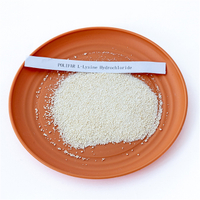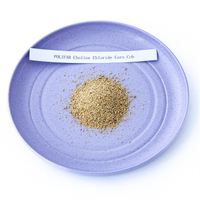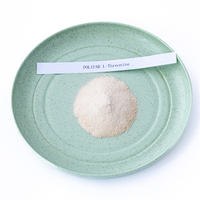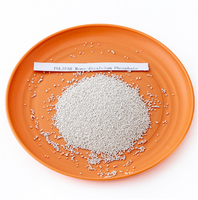Views: 0 Author: Site Editor Publish Time: 2024-11-29 Origin: Site








As a trusted supplier of food-grade additives, Polifar recognizes the growing demand for natural and functional ingredients in food manufacturing. Among these, food-grade citric salt (for example sodium citrate) plays a vital role in the food industry. From enhancing flavor profiles to extending shelf life, citric salt is a versatile additive with multiple applications.
In this blog post, we will explore the composition, advantages, and various applications of food-grade citric salt, along with its safety credentials and market potential.
Citric salts are a group of compounds derived from citric acid, a natural acid found in citrus fruits. The most common citric salts include sodium citrate, potassium citrate, calcium citrate, and magnesium citrate. These salts are produced by neutralizing citric acid with the corresponding base. Depending on the type of base used, citric salts have different properties and uses in food products.
At Polifar, we offer a range of food-grade citric salt products, including sodium citrate, potassium citrate, and other variants. These citric salts are used across various food and beverage applications to provide stability, enhance flavors, and improve preservation. Here are the main types of citric salt products we offer:
1. Sodium Citrate (E331)
Sodium citrate is the most widely used citric salt in the food industry. It is derived from citric acid and sodium, and it’s commonly used as a buffering agent, pH regulator, and flavor enhancer. Sodium citrate is especially useful in the production of carbonated beverages, dairy products (such as cheese and yogurt), processed meats, and canned foods. Its ability to stabilize the pH and enhance the flavor profile makes it a key ingredient in products like soft drinks, energy drinks, and sauces.
2. Potassium Citrate (E332)
Potassium citrate is another popular form of citric salt that is used as a substitute for sodium citrate in some applications. It is commonly used in the food and beverage industry as a pH regulator and preservative, but also provides the added benefit of being a potassium source. It is frequently used in low-sodium products or those designed for health-conscious consumers, such as electrolyte drinks, low-sodium foods, and certain dietary supplements. Potassium citrate can also help to improve the texture and stability of dairy products and processed foods.
3. Calcium Citrate
While less common than sodium and potassium citrates, calcium citrate is still an important citric salt in certain food applications. It is often used as a calcium fortifier in beverages, fortified foods, and dietary supplements. It provides a stable, bioavailable source of calcium, which is essential for bone health and other metabolic functions.
4. Magnesium Citrate
Magnesium citrate is another specialized form of citric salt, often used in the food industry for its high bioavailability and as a magnesium supplement. It is commonly added to beverages and foods designed for health-conscious consumers, particularly those seeking to increase their magnesium intake for better muscle and nerve function.
5. Blended Citrates
In some cases, food manufacturers may use blended citrates, which are a mixture of two or more citric salts (such as sodium and potassium citrates). These blends offer the benefits of multiple salts in one formula, providing optimized pH control, flavor enhancement, and mineral content in food and beverage products.

Food-grade citric salts, which include sodium citrate, potassium citrate, calcium citrate, and magnesium citrate, are widely used in the food and beverage industry due to their versatile properties. They serve various functions, ranging from flavor enhancement to pH regulation and mineral fortification. Below are the key applications of food-grade citric salts:
One of the primary uses of citric salts is for pH regulation in food and beverages. They act as acidulants and buffering agents, maintaining the desired acidity in products. This is especially important in:
Carbonated Beverages: Citric salts, particularly sodium citrate, help balance the acidity and enhance the refreshing taste of fizzy drinks. They stabilize the pH, ensuring the carbonation remains intact over time.
Fruit Juices: Potassium citrate helps balance the natural acidity of fruit juices, reducing excess tartness while improving flavor balance.
Dairy Products: Citric salts are used to adjust the pH in products like yogurt and cheese, preventing curdling and enhancing texture.
Citric salts are widely known for their flavor-enhancing properties. They can:
Improve Taste Profiles: Sodium citrate and potassium citrate help reduce the sharpness of acidic flavors, resulting in a smoother and more balanced taste, especially in beverages and processed foods.
Mask Bitter Tastes: In certain applications, such as in sugar-free products or health-focused foods, citric salts help mask undesirable bitter flavors, ensuring a more pleasant eating or drinking experience.
Add a Tangy Taste: Citric salts can also impart a mild tanginess or refreshing acidity to a wide range of food products, from candies to sauces.
Citric salts act as natural preservatives by regulating pH and inhibiting microbial growth. This is essential in:
Canned Foods: Sodium citrate is often used in canned vegetables, fruits, and soups to maintain product freshness and prevent spoilage.
Pickled Products: Citric salts help maintain the ideal pH for pickling, preventing the growth of bacteria and fungi while preserving the crispness and flavor of the product.
Processed Meats: Potassium citrate and sodium citrate are used to preserve the quality and safety of processed meats by controlling the acidity and extending shelf life.
Citric salts, especially calcium citrate and magnesium citrate, are important sources of essential minerals in fortified foods. They are often used in:
Fortified Juices: Calcium citrate is a popular additive in juices, particularly plant-based milks, as it helps provide an additional source of calcium for bone health.
Dietary Supplements: Magnesium citrate is commonly included in dietary supplements due to its bioavailability and health benefits, particularly for heart, muscle, and bone function.
Nutritional Bars and Supplements: Citric salts are also added to energy bars, powdered drink mixes, and other health-focused products to improve mineral intake without altering flavor profiles.
Citric salts are used in baking and confectionery for their acidity and solubility. Their applications include:
Baked Goods: Sodium citrate is used to activate leavening agents such as baking soda, helping dough rise and achieve a light, fluffy texture.
Candies and Sweets: Citric salts, particularly sodium citrate, help enhance the tartness in candies, gummies, and sour sweets, balancing out the sweetness for a more complex flavor.
Preserving Texture: In some types of confectionery, citric salts prevent sugar crystallization and improve the smoothness of fillings and coatings.
Citric salts are increasingly used in health-conscious food products due to their beneficial properties:
Low-Sodium Foods: Potassium citrate is an excellent substitute for sodium in low-sodium food products, helping consumers reduce sodium intake while maintaining flavor and function.
Electrolyte Solutions: Citric salts, especially potassium citrate and magnesium citrate, are often found in electrolyte drinks designed to rehydrate and replenish minerals during physical activity.
In functional beverages such as sports drinks, energy drinks, and vitamin-enriched water, citric salts are added to enhance stability, flavor, and mineral content:
Electrolyte Balance: Citric salts like potassium citrate help maintain proper electrolyte balance in the body, making them a key ingredient in hydration products.
Improved Taste: They also contribute to the desired tartness in fruit-flavored drinks, providing a more appealing taste to consumers.
The future of food-grade citric salts looks promising as they continue to play an essential role in the food and beverage industry. With increasing consumer demand for clean-label, natural ingredients, citric salts like sodium citrate, potassium citrate, and calcium citrate are poised to meet the need for safe and versatile additives. As the health and wellness trend grows, these salts offer added nutritional benefits, such as supporting bone health or muscle function, while also improving taste and texture. Additionally, food-grade citric salts align with sustainability efforts, as they are biodegradable and produced from renewable sources. As the industry embraces innovation and sustainability, the use of citric salts is expected to expand into new applications, from plant-based products to functional foods, ensuring their continued relevance in the ever-evolving food market.
If you’re looking for a reliable supplier of food-grade citric salt, look no further than Polifar. Our products are crafted with the highest standards of quality, ensuring that your food products meet both safety regulations and consumer expectations. We’re here to support your production needs and help you innovate in the ever-evolving food industry.
Contact us today to learn more about our food-grade citric salt and other food additives. Together, let’s create better, safer, and tastier food products for the world.






